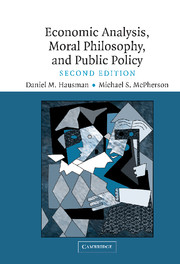Appendix: How Could Ethics Matter to Economics?
Published online by Cambridge University Press: 06 July 2010
Summary
We hope in this book to have shown how knowing moral philosophy can help one to do economics better. The most persuasive way to make this case is the one we pursued in the main text: by describing important aspects of moral philosophy and showing their bearing on economics. But many economists are inclined to deny that moral philosophy has anything to do with economics. Why? In this appendix, we shall explore the reasons and reaffirm the conclusion of this book – that ethics is relevant to economics.
As explained in Chapter 1, one can distinguish between “positive” and “normative” inquiries. Positive inquiries address factual questions, whereas normative inquiries address evaluative questions. Although it sounds paradoxical, it is possible to regard what is called “normative economics” as a positive inquiry into the logical presuppositions and practical means to satisfy preferences efficiently, and some economists have in fact viewed normative economics in this way. Most economists, however, concede that normative economics is a normative inquiry addressing evaluative questions and prescriptions; and, as our discussion in Chapters 2 and 15 shows, arguments such as the Summers memorandum do not address only factual questions.
Hence we shall interpret those economists who would deny that moral philosophy is relevant to economics as distinguishing positive and normative economics, as conceding that moral philosophy is relevant to normative economics, and as denying that moral philosophy is relevant to positive economics.
- Type
- Chapter
- Information
- Economic Analysis, Moral Philosophy and Public Policy , pp. 291 - 308Publisher: Cambridge University PressPrint publication year: 2006
- 2
- Cited by



